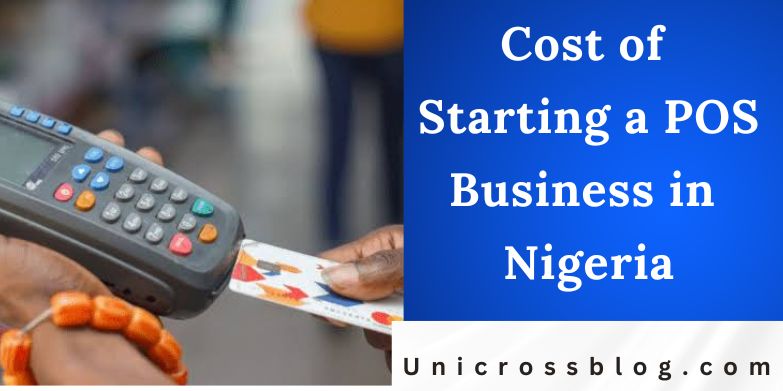The Point of Sale (POS) business has emerged as a highly profitable venture in Nigeria, driven by the increasing demand for accessible financial services, especially in areas with limited banking infrastructure. With Nigeria’s push toward a cashless economy and the Central Bank of Nigeria’s (CBN) financial inclusion initiatives, POS agents serve as mini-banks, offering services like cash withdrawals, deposits, fund transfers, and bill payments.
This business is particularly appealing due to its low entry barriers, daily income potential, and scalability. This guide provides a detailed breakdown of the costs involved in starting a POS business in Nigeria in 2025, along with practical steps.

Cost Breakdown
The cost of starting a POS business in Nigeria varies depending on the scale, location, and service provider. Below is a comprehensive overview of the key expenses:
1. POS Machine Acquisition
The POS terminal is the core equipment for the business. Costs depend on the provider and the machine’s features, such as network support (2G, 3G, or 4G) and whether it’s a smart or classic terminal.
-
Cost Range: ₦15,000 to ₦50,000.
-
Details: Some providers, like Moniepoint or Opay, may offer free terminals if transaction targets are met, though a refundable caution fee (e.g., ₦10,000 for Moniepoint) may apply. Others, like Baxi or Palmpay, charge between ₦25,000 and ₦45,000 outright.
2. Registration and Licensing Fees
Registering with a bank or fintech company often involves a small fee. Additionally, registering your business with the Corporate Affairs Commission (CAC) enhances credibility and is sometimes required by providers.
-
CAC Registration: ₦12,000 to ₦35,000.
-
Provider Registration Fee: ₦5,000 to ₦20,000, depending on the institution.
3. Shop or Kiosk Setup
A physical location is crucial for visibility and customer trust. Costs vary by area (urban vs. rural) and whether you rent a space or use an existing shop.
-
Rent: ₦1,000 to ₦10,000 per month in rural areas; ₦50,000 to ₦200,000 annually in urban centers.
-
Furnishings: Basic setup (table, chair, umbrella, signage) costs ₦10,000 to ₦50,000.
4. Initial Float Capital
The float is the cash you keep for transactions, such as withdrawals. The amount depends on expected customer volume.
-
Cost Range: ₦50,000 to ₦300,000.
-
Details: A small-scale operation may start with ₦50,000, while busier locations may require ₦100,000 or more to avoid running out of cash.
5. Miscellaneous Expenses
Additional costs ensure smooth operations:
-
Internet/Data: ₦2,000 to ₦5,000 monthly for reliable connectivity.
-
Power Supply: A power bank or small generator costs ₦10,000 to ₦40,000 to manage power outages.
-
Marketing and Branding: Signboards, banners, or flyers cost ₦5,000 to ₦20,000.
Total Estimated Startup Cost
-
Minimum: ₦70,000 (free POS terminal, minimal float, rural location).
-
Average: ₦100,000 to ₦200,000 (purchased terminal, moderate float, basic setup).
-
High-End: ₦250,000+ (premium terminal, urban rent, larger float).
Steps to Start a POS Business
-
Conduct Market Research: Assess your area for demand, competition, and banking access. Ideal locations include markets, bus stops, or campuses with high foot traffic but few ATMs.
-
Choose a Provider: Partner with a reliable bank (e.g., Access Bank, First Bank) or fintech (e.g., Moniepoint, Opay, Palmpay). Compare transaction fees and support.
-
Register Your Business: Obtain a CAC certificate and Tax Identification Number (TIN) for credibility and compliance.
-
Secure Funding: Use personal savings, family loans, or low-interest financing to cover startup costs.
-
Acquire a POS Machine: Apply through your provider, submit documents (ID, utility bill, BVN), and test the machine upon receipt.
-
Set Up Operations: Secure a location, fund your float, and promote your services with signage and good customer service.
Profit Potential
A POS business generates income through transaction fees:
-
Withdrawals: ₦100 to ₦1,000 per transaction (e.g., ₦100 for ₦10,000 withdrawn).
-
Transfers/Deposits: ₦20 to ₦500 per transaction.
-
Additional Services: Airtime sales, bill payments, and data top-ups yield ₦3 to ₦50 per transaction. With 50–100 daily transactions, agents can earn ₦3,500 to ₦20,000 daily, translating to ₦87,500 to ₦500,000 monthly, before expenses. Profitability depends on location, transaction volume, and cost management.
Challenges to Consider
-
Network Issues: Poor internet can disrupt transactions. Use reliable SIM cards and backup networks.
-
Security Risks: Cash handling attracts fraud or theft. Limit cash on hand and use secure machines.
-
Competition: Stand out with excellent service, fair fees, and additional offerings like bill payments.
-
Regulatory Compliance: Adhere to CBN guidelines, such as KYC limits (₦20,000 for unverified users) and transaction reporting.
Conclusion
Starting a POS business in Nigeria in 2025 is a viable opportunity for entrepreneurs seeking daily income with low startup costs. With an investment of ₦70,000 to ₦200,000, you can launch a small-scale operation and scale up as profits grow. Success hinges on choosing the right location, provider, and operational strategies while managing challenges like competition and network reliability. By following the outlined steps and staying compliant with regulations, you can build a sustainable and profitable POS business.
READ ALSO: Best Small-Capital Business Ideas for Nigerian Students
FAQs
Can I start a POS business with ₦50,000?
Yes, it’s possible with a free POS terminal from providers like Opay or Moniepoint, a small float (₦30,000), and minimal setup (e.g., an umbrella and table). However, this limits your scale and transaction capacity.
Is a POS business still profitable in 2025?
Absolutely. The demand for cash and digital transactions remains high, especially in underserved areas. Daily earnings of ₦5,000–₦20,000 are achievable in busy locations.
Which POS provider is best?
Moniepoint, Opay, and Palmpay are popular due to low or no terminal costs, reliable networks, and competitive fees. Choose based on transaction charges and support in your area.
Do I need CAC registration?
Not always mandatory, but it’s recommended for credibility and to meet some providers’ requirements. It costs ₦12,000–₦35,000.
How can I attract customers?
Set up in a high-traffic area, use clear signage, offer competitive fees, and provide excellent customer service. Promotions like free withdrawals for new customers can help.







